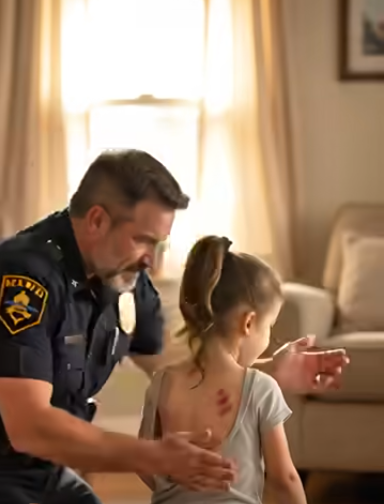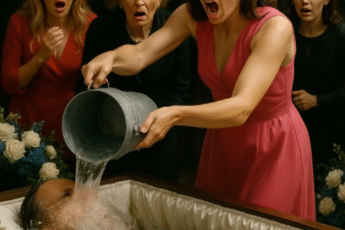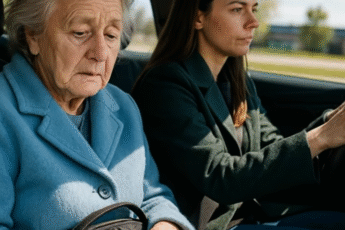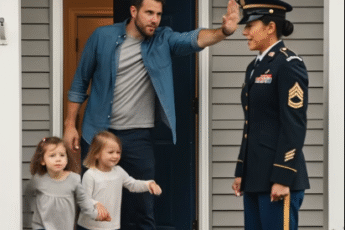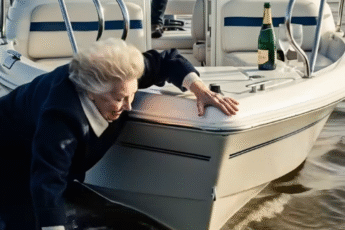The first pale light of Sunday morning filtered through the blinds as Officer Michael Miller brewed his coffee, his mind already running through the checklist of the day ahead. At 42, with salt-and-pepper hair and tired eyes that had seen too much in his 15 years on the force, Sundays were his anchor. It was the day his seven-year-old daughter, Sophie, would return from her mother’s house, filling his modest two-bedroom apartment with her bright laughter and a whirlwind of stories. He glanced at his watch. Laura, his ex-wife, was usually punctual with drop-offs, if nothing else. The divorce had been finalized 11 months ago, and while the wounds were still raw, they had managed to establish a fragile rhythm for Sophie’s sake.
The doorbell rang, and a genuine smile broke through Michael’s weary expression. He swung the door open, the cheerful greeting dying on his lips. Sophie stood on the welcome mat, her usual exuberant energy replaced by a heavy stillness. Her eyes were downcast, her small shoulders slumped in a way that made his heart clench.
“Hey, Princess,” he said, kneeling to her level. “Everything okay?”
Laura stood behind her, keys jangling nervously in her hand. Her gaze was fixed somewhere over his shoulder. “She’s just tired. Nathan took her hiking yesterday.”
Nathan Bennett. Laura’s new husband of three months, a fitness coach with impossibly white teeth and a bottomless supply of motivational quotes. Michael had met him exactly twice and had reserved judgment, for Sophie’s sake.
“That right, Soph? Did you have fun hiking?” Michael asked gently, reaching for her small backpack.
Sophie clutched it tighter, her eyes still glued to the floor. “I need to be stronger,” she whispered, the words barely audible.
Laura checked her watch, a gesture of dismissal. “I’ve got to run. Sophie, remember what we talked about? Big girls don’t mope.” She leaned down, gave the top of Sophie’s head a perfunctory kiss, and was gone before Michael could probe further.
Inside, Sophie moved with a strange, careful deliberation, as if testing each step. When Michael finally helped her remove her backpack, she winced, a sharp intake of breath she tried to stifle. Parental alarm bells, honed by years of police work, began to clang in his mind.
“Sophie, does something hurt?” he asked, his voice calm despite the cold knot forming in his stomach.
She bit her lip, those big brown eyes—so like her mother’s—welling with tears she seemed determined not to shed. “My back… from the training.”
“Training? What training, sweetie?”
Sophie’s voice dropped to a whisper, a secret she was afraid to tell. “Nathan says I need special training to get strong. In the basement… with the heavy boxes.” Her chin trembled as she finally looked up at him, her small face a mask of confusion and pain. “He promised it wouldn’t hurt, Papa. But it did. It hurts a lot.”
Michael felt ice slide into his veins. He gently turned his daughter around and lifted the back of her shirt. Faint, mottled bruises patterned the skin along her small shoulder blades. His police officer’s mind began to catalog evidence, even as his father’s heart cracked in two.
“He times me,” Sophie continued, the words tumbling out now that the dam had broken. She reached for her beloved stuffed rabbit, Hoppy, the one constant companion that traveled between their two homes. “If I stop or cry, I have to start over. He says tears are for babies, and Mommy doesn’t want a baby anymore. She wants a strong girl.”
Michael kept his voice steady through sheer force of will, a skill perfected over years of crisis negotiation. “Can you tell me more about this training, Sophie?”
She nodded, her small hands twisting Hoppy’s ears. “Nathan says all champion kids do it. He makes me carry the boxes up and down the stairs. If I put them down, he adds more time. Yesterday… yesterday I couldn’t finish because my arms were shaking too much. He said I disappointed him.”
Michael’s mind raced through a protocol of options: hospital documentation, calls to his partner on the force, his lawyer. But first, his primary mission was to secure the scene, to make his daughter feel safe.
“You know what I think?” he said, brushing a strand of hair from her tear-streaked face. “I think we need pancakes with chocolate chips. And then, maybe you can draw me a picture of this training. Would that be okay?”
Sophie nodded, the ghost of a smile touching her lips. “Can I make them shaped like stars?”
“Absolutely. And Sophie?” Michael waited until she met his eyes, his gaze steady and certain. “You never, ever disappoint me. Not ever.”
As Sophie carefully measured flour into a bowl, her small brow furrowed in concentration, Michael stepped into the hallway, his hand shaking slightly as he dialed his partner’s number. Whatever was happening at Laura’s house, whatever twisted version of “strength” she and her new husband were peddling, it ended now.
Detective James Rodriguez, Michael’s partner of seven years, arrived still in his Sunday clothes, having come straight from church. At 50, with three grown kids of his own, James had a quiet, observant nature that saw things others missed.
“Where’s our girl?” he asked softly, his eyes taking in Michael’s tense posture.
“Watching cartoons,” Michael replied, his voice tight. He spread Sophie’s drawings across the kitchen counter. She had drawn them after breakfast, a disturbing visual narrative.
James studied the crayon illustrations. A basement with stick figures carrying heavy boxes. A large, menacing stopwatch. A small figure in the corner with tears carefully colored blue. The last drawing was the most heartbreaking: a house split in two, one half bright with a smiling sun, the other dark and filled with storm clouds.
“We need to document everything properly,” James said, his voice all business, but his eyes troubled. “Photos of any marks, a medical examination, her statement. But Michael,” he placed a firm hand on his partner’s shoulder, “you need to remember, you’re her father first, police officer second. Let me handle the official side of this.”
Michael nodded, his jaw tight with a rage he was struggling to contain. “The doctor at Mercy General knows us. She’ll be gentle with Sophie.”
Dr. Catherine Chen, with her gray-streaked hair and kind eyes magnified by her glasses, spoke directly to Sophie, instantly putting her at ease. “I’m just going to look at your back, Sophie. You’re in charge here. If you want me to stop, you just say so,” she said.
Sophie looked at her father, who gave her an encouraging nod. “It’s okay, sweetheart. I’ll be right here.”
The examination confirmed bruising consistent with carrying heavy, repeated loads. Nothing that required immediate medical intervention, but it was deeply concerning.
“I need to file a report,” Dr. Chen told Michael quietly, while a nurse showed Sophie the large fish tank in the waiting area. “Child Services will need to be notified.”
Michael had expected this. It was procedure. “I understand. Could you request Emily Foster? She’s experienced and compassionate.”
Back at home, Sophie seemed lighter, as if sharing her secret had lifted a physical weight from her small shoulders. While she napped, exhausted from the morning’s events, Michael made the hardest call.
“We need to talk about what’s happening at your house,” he began the moment Laura answered.
“What are you talking about?” Laura’s voice was immediately defensive, a wall going up between them.
“Sophie has bruises, Laura. She told me about Nathan’s ‘training’ sessions.”
A beat of silence. Then, “She’s exaggerating. Nathan is teaching her discipline, something you’ve always been too soft to do.”
Michael closed his eyes, counting to five. “A doctor has documented her injuries. Child Services is being notified.”
“You had no right!” Laura’s voice rose, sharp and accusatory. “You’re using your badge to manipulate the situation! Nathan is helping Sophie build character!”
“By forcing a seven-year-old to carry heavy boxes until she’s in pain? That’s not character, Laura, that’s cruelty!”
“She needs to learn perseverance! The world isn’t kind to weak people, Michael. You of all people should know that.”
The conversation ended with Laura threatening to call her lawyer. Michael sat at the kitchen table, his head in his hands, the weight of the world pressing down on him. A small voice broke through his despair.
“Is Mommy mad at me?” Sophie stood in the doorway, Hoppy clutched to her chest, her eyes wide and worried.
Michael crossed the room in two strides and knelt before her, his heart aching. “No, princess. Grown-ups sometimes disagree about what’s best for kids. But none of this is your fault. Not one single bit.”
Sophie’s eyes, wise beyond her years, studied his face. “Nathan says mistakes are always somebody’s fault.”
“Well,” Michael said carefully, choosing his words like he was defusing a bomb, “Nathan is wrong about that. And about a lot of other things, too.”
The following days were a carefully orchestrated dance of interviews, documentation, and quiet observation. Emily Foster, the social worker, arrived with a calm, no-nonsense demeanor that put Sophie at ease. She sat on the floor with Sophie, asking about Hoppy before gently guiding the conversation to Nathan.
“Nathan says I have to be strong like Mommy,” Sophie explained, arranging colored pencils in perfect, obsessive rows as she spoke. “He says Mommy had to learn to be strong when she was little, too.” Emily glanced at Michael, who made a note. This was new, a possible key to understanding Laura’s complicity.
Meanwhile, James was digging into Nathan Bennett’s background. “His program isn’t even licensed,” James reported, looking up from his computer at the station. “He calls it ‘Champion Kids’ and runs it from his home basement. No formal complaints, but I found some concerning online reviews. Parents saying their kids became anxious, lost interest in activities they used to enjoy.”
Emily’s research uncovered more. Nathan Bennett had grown up in a rigid military household. His father was a drill sergeant. His fitness center specifically marketed to divorced mothers, offering discounts and childcare. That’s how he had met Laura.
The meeting at the coffee shop was a tense, sterile affair. Nathan, radiating an unnerving confidence, launched into a well-rehearsed speech about building character and the pitfalls of “soft parenting.” Laura nodded along, but Michael saw the flicker of doubt in her eyes, the doubt she was trying to hide, even from herself.
The real breakthrough came from an unexpected source. Mrs. Wilson, Sophie’s second-grade teacher, asked to speak with Michael privately one morning.
“I’ve noticed changes in Sophie over the past few months,” she said, her kind face etched with concern. “She used to be our classroom sunshine. Lately, she’s withdrawn, anxious about making mistakes.” She handed Michael a folder of Sophie’s artwork. The drawings showed a clear progression, from bright, colorful scenes of family and friends to increasingly dark, constricted images. The most recent one showed a small figure standing alone in a basement, surrounded by looming boxes.
“Whatever’s happening,” Mrs. Wilson said, her voice firm, “don’t let anyone convince her that being sensitive is the same as being weak. It’s her superpower, not her flaw.”
That evening, Michael gently asked Sophie about a note from her teacher regarding an incident in gym class.
“We had to climb the rope,” Sophie explained, carefully arranging her carrot sticks in parallel lines. “I was scared to go high.”
“That’s okay. Lots of kids find rope climbing scary.”
Sophie shook her head, her expression serious. “Nathan says fear is just weakness leaving your body. But it didn’t leave. It got bigger.” Her small hands trembled slightly. “I tried to climb so no one would think I was a baby, but my hands got all sweaty and I fell. I cried… in front of everyone. Nathan says tears are for bedtime only.”
Michael set down his spoon. “Sophie, can I tell you something important? Being brave doesn’t mean you never feel scared. It means doing your best even when you are scared. And crying doesn’t mean you’re weak. It means you have a big, beautiful heart that feels things deeply.”
The weekend arrived with a sense of impending doom. It was Laura’s turn for custody. Michael felt physically ill watching Sophie pack her small backpack, her movements tense and methodical.
“Remember, you can call me anytime, day or night,” he said, kneeling to her level.
Sophie nodded, clutching Hoppy. “What if Nathan takes my phone away again? He says devices make kids soft.” Michael hadn’t known about this, another violation of their agreement.
Late that night, his phone rang. It was nearly midnight.
“Papa?” Sophie’s voice was a frantic, barely audible whisper. “I’m hiding in the bathroom. Nathan took my phone, but I snuck it back. They’re saying I have to do special training tomorrow. With Colonel Bennett—his dad—watching. Nathan says if I embarrass him, I’ll lose all my stars.”
Michael’s heart pounded. “What kind of training, Sophie?”
“The hard kind… with the big boxes from the garage and…” Her voice cut off abruptly. He heard muffled voices, then Nathan’s voice, cold and clear.
“Officer Miller, it’s inappropriate to call this late. Sophie should be asleep.”
“Put my daughter back on the phone.”
“She’s upset and confused. You’re undermining our parental authority. Good night, officer.” The call ended.
Michael immediately called back. Voicemail. He called Laura. Voicemail. A text from an unknown number lit up his screen. It was from Eleanor, Laura’s mother. Need help. Sophie with me at Bennett house. Nathan and father planning special training demo with guests. Laura upset but won’t stop it. Sophie terrified.
That was it. Procedure be damned.
“Sometimes being in the right place at the right time makes all the difference,” James said, as they drove towards the Bennett’s isolated property an hour north of the city.
The scene in the backyard was a grotesque parody of a family gathering. Several adults stood watching as a group of children, Sophie among them, struggled to carry weighted backpacks across an obstacle course. Colonel Bennett, a man carved from granite, timed them with a stopwatch, while Nathan barked commands.
Sophie’s face was streaked with tears as she stumbled and fell to her knees.
“Up, Sophie! Champions don’t quit! Everyone’s watching!” Nathan yelled.
Michael moved without thinking, his voice cutting through the unnatural silence. “That’s enough.”
He knelt beside his daughter, who was frozen, her eyes wide with a mixture of shock and relief. He gently removed the heavy backpack. “She’s done. We’re leaving.”
Colonel Bennett stepped forward. “Young man, you’re interrupting an important character-building exercise.”
“What she needs,” Michael replied evenly, lifting Sophie into his arms, “is to be protected from people who confuse cruelty with character.”
The confrontation that followed was swift and decisive. Other parents, witnessing the raw reality of the “training,” began to question Nathan. Laura appeared from the house, her face a mess of tears and conflict. Something shifted in her expression as she looked from Nathan’s hardening face to her daughter, limp with exhaustion and fear in Michael’s arms.
The judge’s ruling was swift. Temporary full custody was granted to Michael, with supervised visitation for Laura. Nathan’s “Champion Kids” program was shut down pending a full investigation.
The days that followed were a mixture of relief and delicate readjustment. Sophie began therapy with Dr. Palmer, a kind woman who used art to help Sophie process her feelings. In their first session, Sophie drew a black box with a small figure inside. “This was me in the training room,” she explained. Then she drew a door. “Papa made a door. And Mommy finally saw what was happening.”
Laura, having left Nathan, started her own therapy. “I was so blind, Michael,” she admitted during one of their stilted but necessary conversations. “He recognized my insecurities and sold me a twisted version of strength. I thought I was helping her, but I was just repeating a cycle from my own childhood.”
Slowly, carefully, they began to rebuild. Sophie’s laughter returned, louder and more frequent. She started a new art class, her drawings once again filled with color and light. Laura found a new apartment, and Sophie, on her own terms, began to visit, starting with short afternoons and eventually, an overnight stay.
Months later, Michael and Laura stood together at the city’s annual student art showcase. In the center of the exhibit, holding a place of honor, was Sophie’s painting. It depicted a tiny green sprout pushing its way through a crack in gray concrete, reaching for a bright, yellow sun. The title, printed in a child’s careful block letters, was simple: Growing Anyway.
As they watched their daughter, now chattering confidently with the exhibit’s curator, no longer the frightened child who checked every action for approval, Laura whispered, “She’s going to be okay, isn’t she?”
Michael nodded, his throat tight with an emotion he couldn’t name. “More than okay. She’s going to be extraordinary.”
That night, as he tucked Sophie into bed, she looked up at him, her eyes serious in the soft glow of her nightlight. “Papa, I have one thing to remember from all of this.”
“What’s that, princess?”
“You believed me. Right from the very beginning, you believed me. That’s the most important part of the whole story.”
He kissed her forehead, his heart full. The journey had been a nightmare, but here, in the quiet of his daughter’s room, he saw the promise that had been fulfilled. Not Nathan’s broken, twisted promise about strength, but the deeper, sacred promise between a parent and child: to protect, to believe, to heal. Some promises, it turned out, didn’t hurt at all. They saved.
